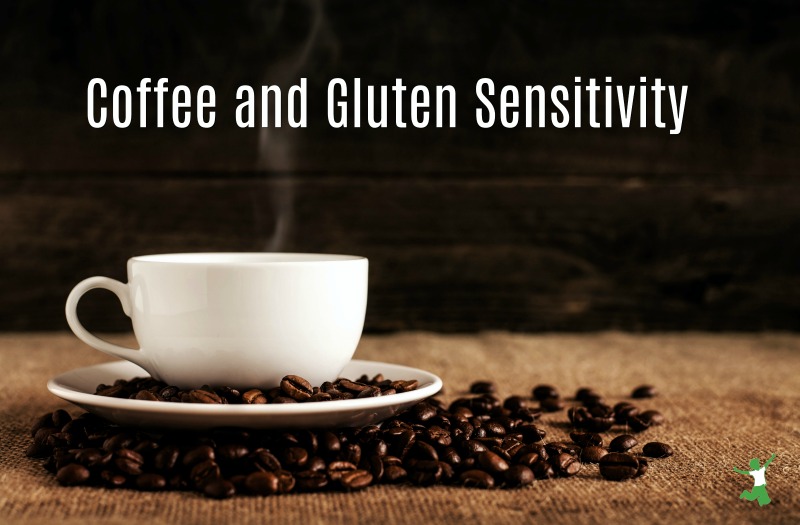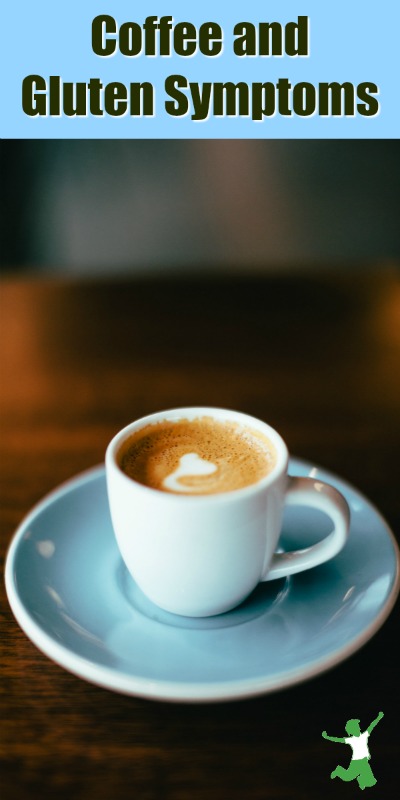Table of Contents[Hide][Show]
Coffee should be avoided by those who are Celiac and many who suffer from wheat sensitivity as it contains cross-reactive proteins to gluten.

If you drink coffee, even bulletproof coffee and have gluten sensitivity or celiac, you might want to sit down for this one.
There is a surprising connection between gluten and coffee that is by and large ignored by the health community. This revelation holds ramifications for other autoimmune disorders as well.
The problem has nothing to do with caffeine, so decaf coffee would be included in this discussion.
In a nutshell, fairly recent lab research has revealed that 10% of coffee is a protein that cross-reacts with gluten antibodies.
This means that if you are gluten sensitive or celiac and are avoiding gluten-containing grains or perhaps have even gone completely grain-free if you still drink coffee there is a strong likelihood that the protein in the coffee is triggering the very same gluten-related health problems you are trying to avoid.
In other words, even if you think you are doing fine with your current gluten-free diet, it is very possible that skipping the coffee could take your health to the next level.
Symptoms of Gluten Sensitivity
Most people who are gluten sensitive don’t realize it because gastrointestinal problems like burping, gas, tummy upset, or toilet issues are the least common way for gluten issues to present themselves!
The most common symptoms of gluten sensitivity?
Migraines and other neurological issues – even MS!
Hormone and endocrine problems are another common way for gluten issues to manifest themselves.
How Coffee Triggers Gluten Sensitivity
So what exactly happens when a gluten sensitive person eats gluten?
Folks with gluten antibodies react to any gluten in the diet by mounting an immune response. This means that gluten is perceived by the body as an invader and the gluten antibodies attack the gluten itself trying to destroy it. This gluten attack is an inflammatory response and inflammation issues can occur anywhere in the body in any tissue or organ.
Here’s the real shocker I came across when researching the coffee/gluten connection:
According to Dr. David Clark DC, functional neurologist and endocrinologist:
There’s not a disease or health condition you can think of that does not have an association – in the research literature – with gluten sensitivity.
That’s a very strong statement!
In essence then, if you are gluten sensitive in any way shape or form, and it seems that most people are whether they know it or not given the epidemic levels of autoimmune issues today, gluten antibodies have the potential to react to proteins in other foods as if they are gluten thereby triggering an immune and inflammatory response.
The protein in coffee is the most common cross-reactor for gluten. Because it is the protein in the coffee that is the trigger, switching to decaf coffee does not solve the problem. Apparently, instant coffee is the worst offender.
Is it possible to be gluten sensitive and not cross-react to coffee? Yes, it’s possible but you’ll have to do some expensive lab testing with a knowledgeable doctor to find out.

Reference
Journal of Food and Nutrition Sciences
More Information
You Probably Need to Change WHEN You Drink Coffee
Coffee Enema
Morning Coffee Fix
Caffeine and Chronic Back Pain
Healthy Coffee Substitutes








Wow. I have been paleo for about a year now and have attempted to cut out coffee numerous times but I just have a LOVE for it. Reading this post may have given me a little more of the “push” I’m in need of. I recently had some blood drawn to test some hormone levels and have some hormonal imbalances. Sigh. I truly am addicted to the beverage 😛
Anyone know what can be taken to help promote sleep.
Any help will be appreciated
Thanks
Seemingly ironically — but not if you understand homeopathy — homeopathic coffea promotes sleep. And don’t worry that it’s like consuming coffee because the dose in homeopathic remedies is so very, very tiny that it is not akin to consuming the real thing.
Monica, please report back here and let us know if it helps.
I love Natural Vitality’s Natural Calm. It is a water soluble form of magnesium citrate. In my experience it works much better for muscle cramps and relaxation than pill forms of magnesium citrate. I just discovered it a few days ago. I will never go without it now! It knocked out my horrible leg cramps that were not budging with magnesium in pill form. It makes me feel very relaxed. It doesn’t knock you out like a drug would, but I think if you dim the lights in your home for an hour or so and then drink the Natural Calm around 15 minutes before bedtime you will sleep like a baby. They have it at Whole Foods, Lucky Vitamin, Amazon, and VitaCost. I tried the raspberry-lemon flavor, which has organic raspberry, organic lemon, and organic stevia, but they do have an unflavored version.
I’ve been wanting to try choffy (made from cocoa beans) for a while now. Does that have the same issue? If not, guess that is next on my grocery list as it is supposed to have many health benefits.
I have been diagnosed Celiac for 10 years now and the diagnosing doc ( Dr. Luciani) told me then- no more coffee for these reasons. It makes a world of difference. Like Sarah says – it takes your health to the next level. Especially after going through GAPS to heal the gut. Between kombucha, oolong tea and my handcrafted coffee substitute I am a happy camper and so is my gut.
I thought I would go though coffee withdrawls, but my body felt such relief from not ingesting the coffee. Perhaps sipping on tea helped with that, I don’t know. It was hard to make the choice to let go of coffee, I can’t lie there as I loved and still do love the aroma. But it really is a no brainer given the science to back it up. I would rather live a long healthy life than have a cup of joe and tear my body up again.
How long did it take you to notice a difference after stopping coffee? thanks, Joyce
Joyce, Nora Gedgaudas author of Primal Body, Primal Mind is an expert on gluten and she says the autoimmune reaction from a single exposure to gluten can last 6 months. Obviously, this is an extreme example, but if you go off coffee, give it at least 6 months to judge success or not.
Thanks Sarah! This really is a complex issue….
Thanks again, Sarah! I just bought Nora’s book 🙂 Joyce
So no more coffee for me. That’s a tough one to swallow.
Perhaps I can learn to like tea. Would tea still be okay to drink?
Tea is fine and there is no cross reactivity that I have discovered by reading up on the subject. Watch the caffeine though .. it is soooo easy to get addicted.
Well this makes sense because I never had a problem with coffee or wheat. I actually never have any reaction to coffee at all! My husband has all of the things that you mention; migraines, hyperactivity, upset stomach, etc. it makes sense that it could be both things causing problems. I’ve been trying to get him to do gaps for a while.
Very interesting, Sarah! I’ve always known that coffee is bad for you due to the caffeine addiction, but now I know it can have the same affect as gluten. It seems like this coutnry is determined to get addicted to anything it can all while making it worst.
really it is a very informative information regarding gluten and coffee.in the coffee what they are pouring in .
not to sound stupid, but does that mean that you get to eat whatever you want after that, like gluten even if you have tested positive for gluten sensitivity?
thanks, Joyce
There are no hard and firm answers to this. Some people were born with a gut in such lousy shape that they may need to eat very carefully their entire lives even after healing on GAPS. If you were born to a mother with no gut dysbiosis herself you have an excellent chance of full recovery. Everyone is different. But, you can’t “eat whatever you want” as in the standard american diet. You can “eat whatever you want” from the smorgasboard of traditional foods and grains that are properly prepared – yes.
So Sarah when you say that most people are probably gluten sensitive do you mean most people who have a damaged gut wall or is it possible that those without a damaged gut wall may be gluten sensitive as well?
Since gluten sensitivity is linked in the research to basically all health and disease conditions and all disease begins in the gut, this is why almost everyone should avoid coffee since it would very likely trigger the gluten antibodies present in the bloodstream to launch an immune response which would be inflammatory somewhere in the body. If your gut is healed and sealed, then you are good to go. It would still be wise to avoid coffee though as it has little to no redeeming value other than a few antioxidants which is no way overcomes the negative downside of this health robbing drink. Drinking coffee to me is one of the worst things you can do to your body and will rapidly age you.